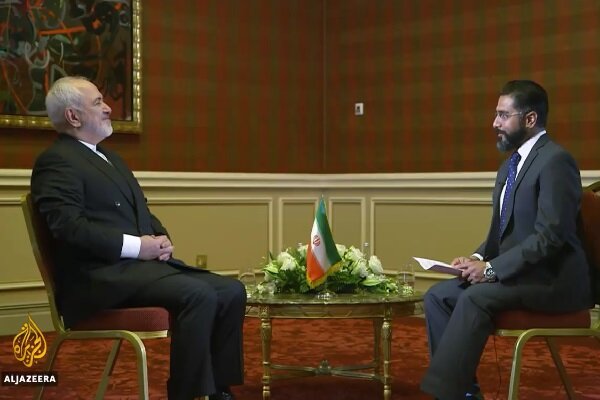Zarif: U.S. sanctions are ‘economic terrorism’

In July 2015, after more than a decade of on-and-off negotiations, world powers reached a nuclear deal with Iran.
Under the Joint Comprehensive Plan of Action, Iran agreed to eliminate its stockpile of enriched uranium and reduce centrifuges. In return, all UN Security Council and multilateral sanctions were lifted.
But not everyone was happy with the deal, including Israeli Prime Minister Benjamin Netanyahu, who said the deal was a “stunning historic mistake”, as well as U.S. Republican presidential candidates at the time.
The campaign against the Iran nuclear deal succeeded when Donald Trump moved into the White House.
The U.S. withdrew from the deal in 2018, and announced that it would reimpose sanctions on Iran.
“Certainly, Iran does not want confrontation and escalation but we have not lived 7,000 years by escaping from those who want to bully us,” Zarif told Al Jazeera.
Iran insisted it would remain in the nuclear deal and so did other signatories such as France, Germany, and the UK.
But tensions between the U.S. and Iran have escalated; the U.S. recently classified Iran’s Revolutionary Guard Corps (IRGC) as “terrorists”, and Iran responded in turn, labelling U.S. troops in the Middle East as “terrorists”.
Unilateral sanctions have also affected Iran’s economy, and the U.S. recently tightened them by ending sanction waivers for countries buying oil from Iran, threatening Iran’s already struggling economy, whose oil production has decreased from 2.5 million barrels per day (bpd) in 2017 to as little as 1.3 million bpd.
In response, Iranian leaders have threatened to close the Strait of Hormuz, a major thoroughfare for oil shipments, but their economy remains vulnerable.
The country’s foreign minister, Mohammad Javad Zarif, says the U.S. sanctions are “economic terrorism”.
“They want to put pressure on the Iranian people in order to change their policy. That is the way the United States has acted for 40 years and, particularly since President Trump came to office, it violated a commitment by another U.S. president, President Obama,” Zarif said.
He said that the sanctions won’t have any “political effect” and that Iran has developed various schemes with partnering countries to help protect themselves.
“One of them will be in the long run to the detriment of the United States and I think that is becoming increasingly popular and that is not to use dollars for your transactions. Second is an instrument that we are developing with the Europeans, we have already developed with our neighbors and we have developed them with the Chinese and that is not to engage in transfer of money across the borders which is where the United States would step in and will try to twist the arms of people who are engaged in it, illegally and unlawfully.”
According to Zarif, the U.S. has been swayed by foreign interests.
“I believe the United States is not serving U.S. interests. More than the United States, it is serving Israeli interests. And unfortunately, there are a couple of people in our region who have aligned themselves with Israeli interests,” he said, listing the crown princes of Saudi Arabia and Abu Dhabi, Mohammed bin Salman and Mohammed bin Zayed.
“So this is a cabal ... who are pushing the United States and President Trump into conflict and into disastrous situations and they will be the first to suffer the consequences, unfortunately.”
“Unfortunately, there are a couple of people in our region (crown princes of Saudi Arabia and Abu Dhabi) who have aligned themselves with Israeli interests,” Iran’s chief diplomat says.
Leave a Comment